Business Law and Ethics: UK Employment Law Structure and CSR Analysis
VerifiedAdded on 2023/06/10
|7
|2007
|267
Report
AI Summary
This report delves into two key aspects of business law and ethics: UK employment law and Corporate Social Responsibility (CSR). The analysis of UK employment law examines its structure, sources, and the extent to which it favors employers or employees, highlighting key legislation and legal frameworks. The report then investigates CSR, exploring its definition, historical context, and the extent to which corporations actively engage in CSR initiatives. It discusses the benefits of CSR, such as cost reduction, competitive advantage, enhanced reputation, and employee motivation, drawing upon examples of UK companies and current trends. The report concludes that UK employment law prioritizes employee rights and that CSR is an increasingly important aspect of corporate strategy. The report also includes a detailed reference section with books and journals to support the claims.
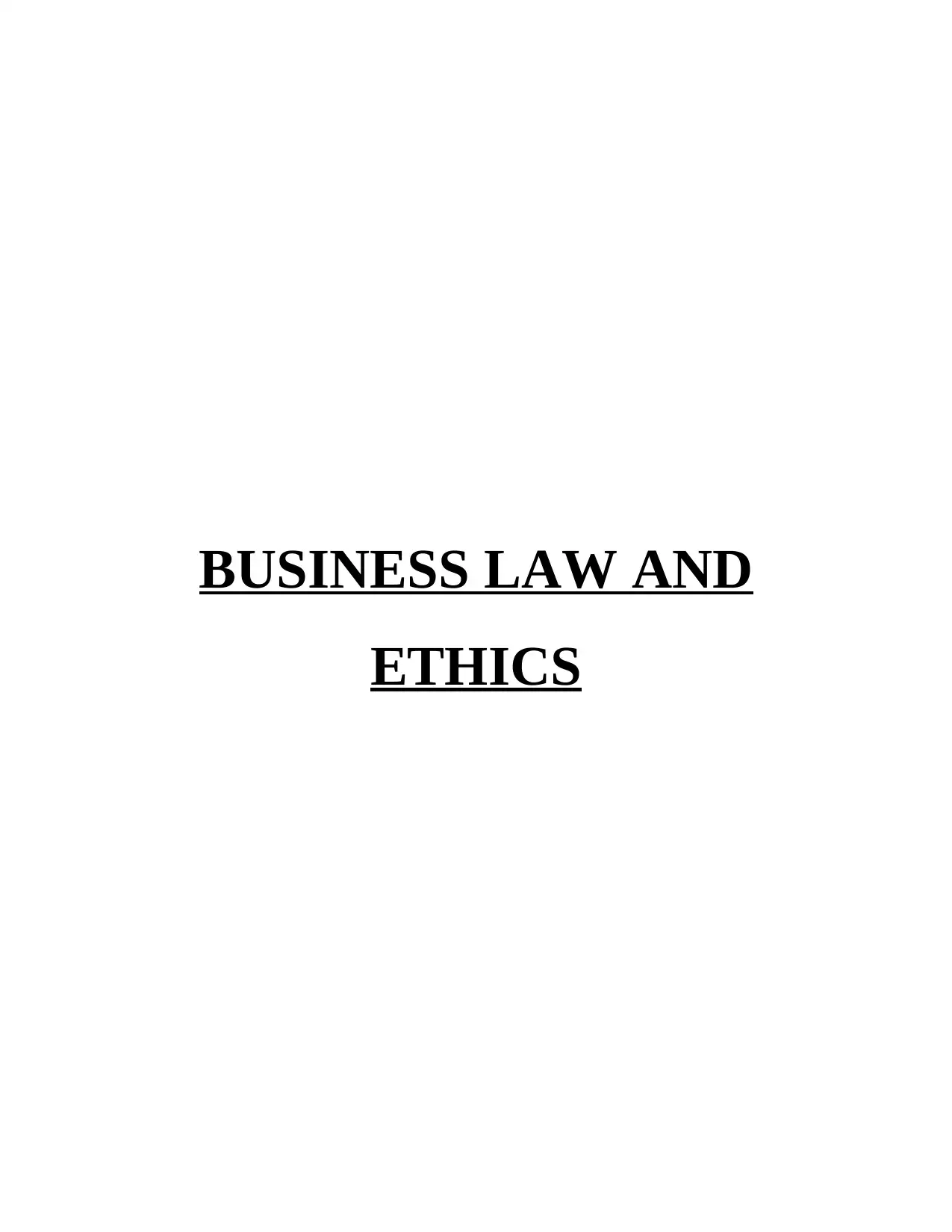
BUSINESS LAW AND
ETHICS
ETHICS
Paraphrase This Document
Need a fresh take? Get an instant paraphrase of this document with our AI Paraphraser
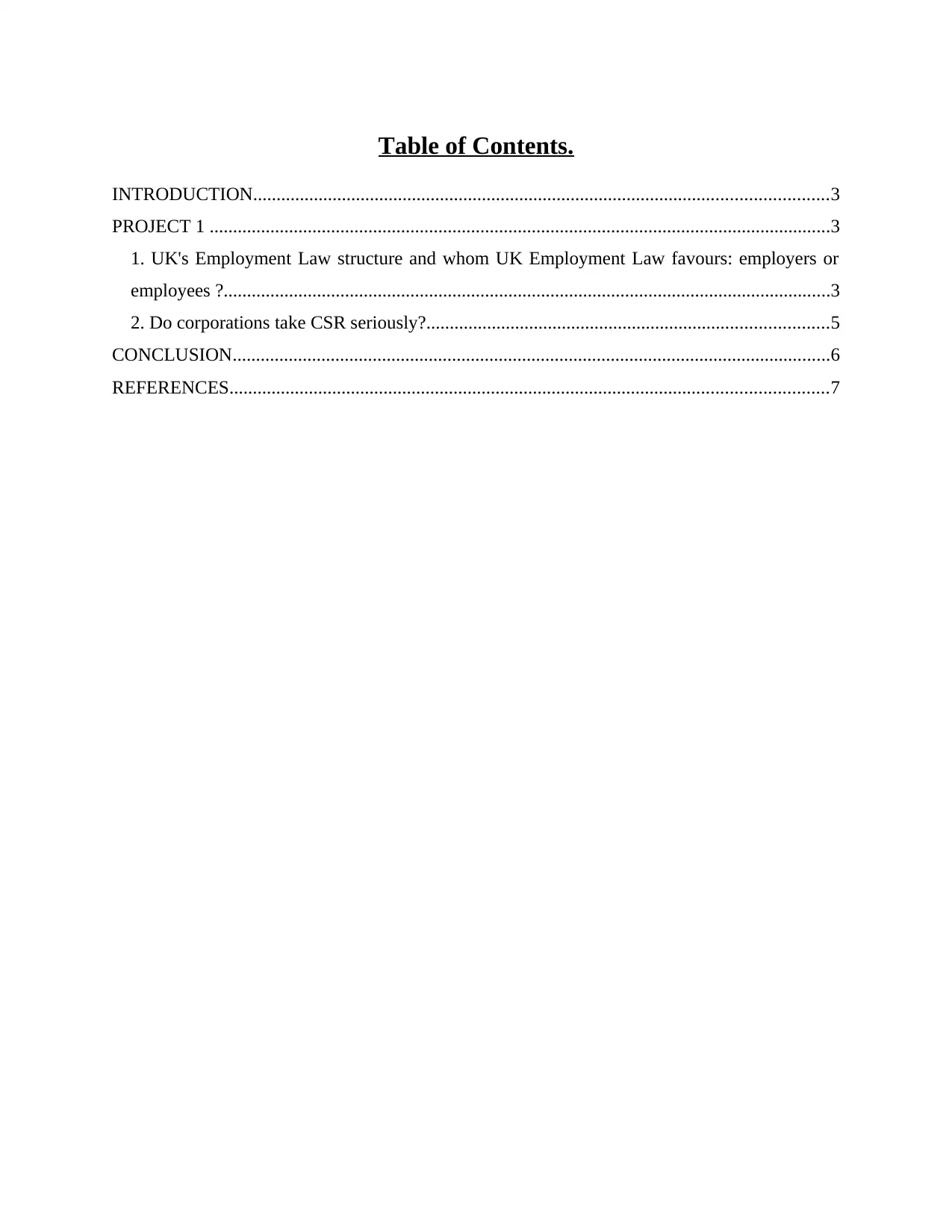
Table of Contents.
INTRODUCTION...........................................................................................................................3
PROJECT 1 .....................................................................................................................................3
1. UK's Employment Law structure and whom UK Employment Law favours: employers or
employees ?..................................................................................................................................3
2. Do corporations take CSR seriously?......................................................................................5
CONCLUSION................................................................................................................................6
REFERENCES................................................................................................................................7
INTRODUCTION...........................................................................................................................3
PROJECT 1 .....................................................................................................................................3
1. UK's Employment Law structure and whom UK Employment Law favours: employers or
employees ?..................................................................................................................................3
2. Do corporations take CSR seriously?......................................................................................5
CONCLUSION................................................................................................................................6
REFERENCES................................................................................................................................7
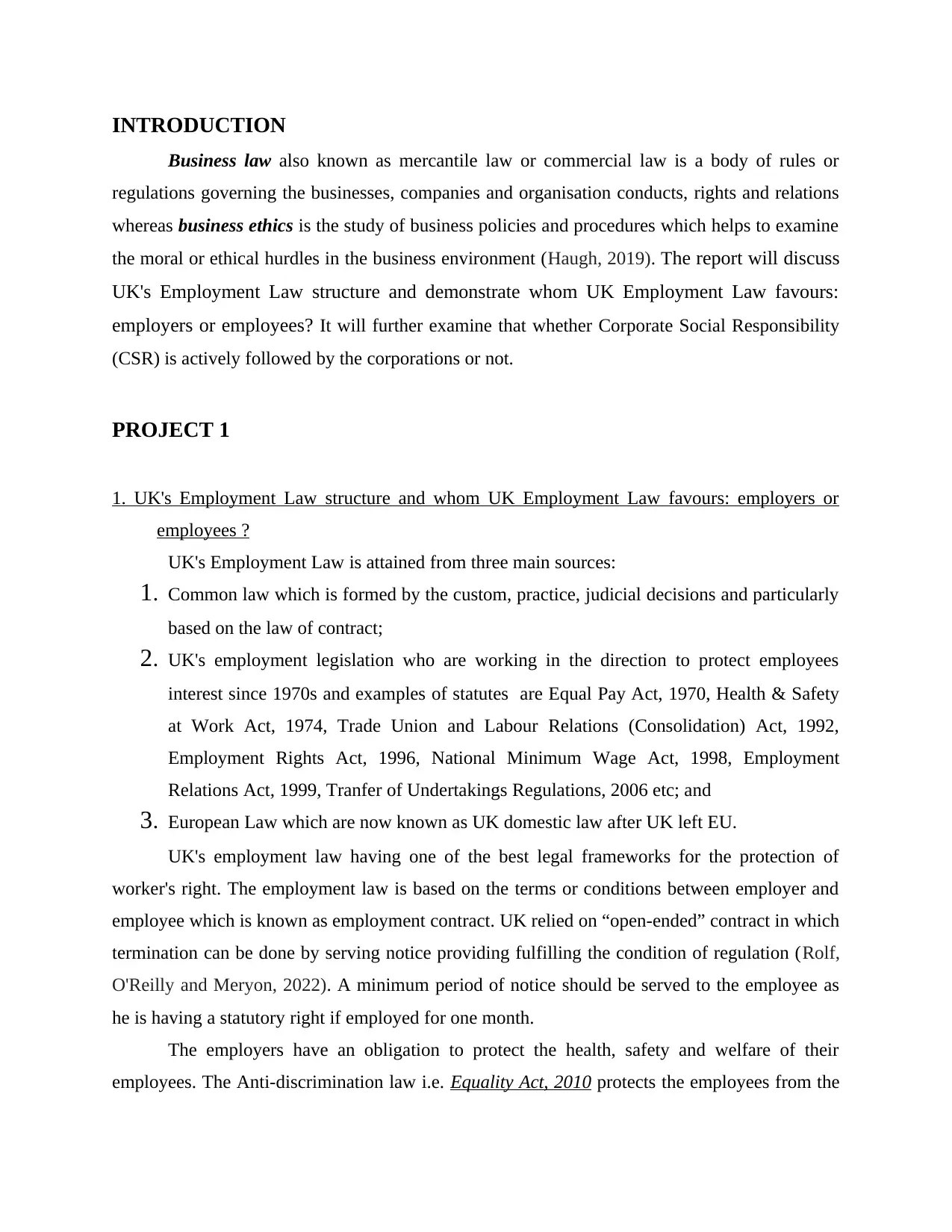
INTRODUCTION
Business law also known as mercantile law or commercial law is a body of rules or
regulations governing the businesses, companies and organisation conducts, rights and relations
whereas business ethics is the study of business policies and procedures which helps to examine
the moral or ethical hurdles in the business environment (Haugh, 2019). The report will discuss
UK's Employment Law structure and demonstrate whom UK Employment Law favours:
employers or employees? It will further examine that whether Corporate Social Responsibility
(CSR) is actively followed by the corporations or not.
PROJECT 1
1. UK's Employment Law structure and whom UK Employment Law favours: employers or
employees ?
UK's Employment Law is attained from three main sources:
1. Common law which is formed by the custom, practice, judicial decisions and particularly
based on the law of contract;
2. UK's employment legislation who are working in the direction to protect employees
interest since 1970s and examples of statutes are Equal Pay Act, 1970, Health & Safety
at Work Act, 1974, Trade Union and Labour Relations (Consolidation) Act, 1992,
Employment Rights Act, 1996, National Minimum Wage Act, 1998, Employment
Relations Act, 1999, Tranfer of Undertakings Regulations, 2006 etc; and
3. European Law which are now known as UK domestic law after UK left EU.
UK's employment law having one of the best legal frameworks for the protection of
worker's right. The employment law is based on the terms or conditions between employer and
employee which is known as employment contract. UK relied on “open-ended” contract in which
termination can be done by serving notice providing fulfilling the condition of regulation (Rolf,
O'Reilly and Meryon, 2022). A minimum period of notice should be served to the employee as
he is having a statutory right if employed for one month.
The employers have an obligation to protect the health, safety and welfare of their
employees. The Anti-discrimination law i.e. Equality Act, 2010 protects the employees from the
Business law also known as mercantile law or commercial law is a body of rules or
regulations governing the businesses, companies and organisation conducts, rights and relations
whereas business ethics is the study of business policies and procedures which helps to examine
the moral or ethical hurdles in the business environment (Haugh, 2019). The report will discuss
UK's Employment Law structure and demonstrate whom UK Employment Law favours:
employers or employees? It will further examine that whether Corporate Social Responsibility
(CSR) is actively followed by the corporations or not.
PROJECT 1
1. UK's Employment Law structure and whom UK Employment Law favours: employers or
employees ?
UK's Employment Law is attained from three main sources:
1. Common law which is formed by the custom, practice, judicial decisions and particularly
based on the law of contract;
2. UK's employment legislation who are working in the direction to protect employees
interest since 1970s and examples of statutes are Equal Pay Act, 1970, Health & Safety
at Work Act, 1974, Trade Union and Labour Relations (Consolidation) Act, 1992,
Employment Rights Act, 1996, National Minimum Wage Act, 1998, Employment
Relations Act, 1999, Tranfer of Undertakings Regulations, 2006 etc; and
3. European Law which are now known as UK domestic law after UK left EU.
UK's employment law having one of the best legal frameworks for the protection of
worker's right. The employment law is based on the terms or conditions between employer and
employee which is known as employment contract. UK relied on “open-ended” contract in which
termination can be done by serving notice providing fulfilling the condition of regulation (Rolf,
O'Reilly and Meryon, 2022). A minimum period of notice should be served to the employee as
he is having a statutory right if employed for one month.
The employers have an obligation to protect the health, safety and welfare of their
employees. The Anti-discrimination law i.e. Equality Act, 2010 protects the employees from the
⊘ This is a preview!⊘
Do you want full access?
Subscribe today to unlock all pages.

Trusted by 1+ million students worldwide
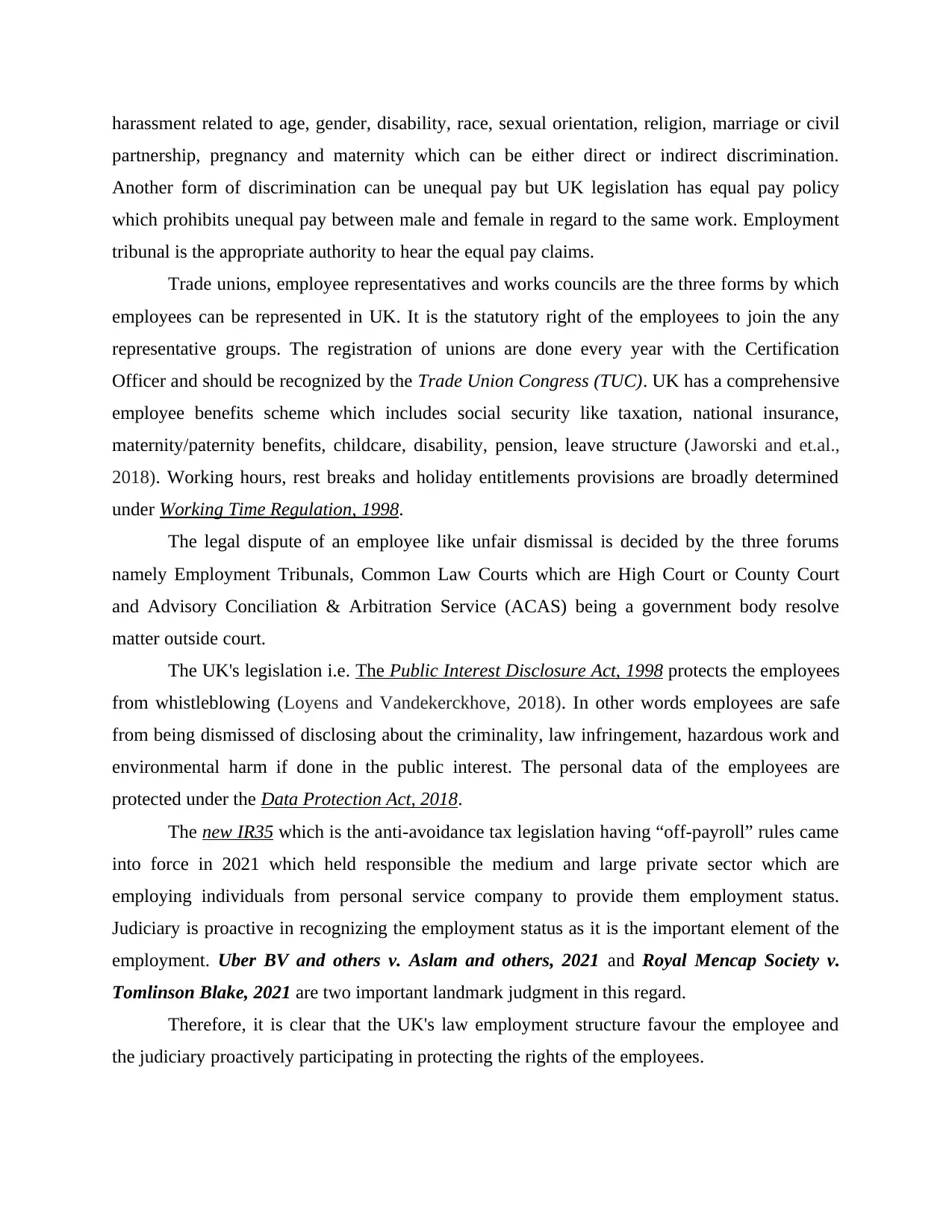
harassment related to age, gender, disability, race, sexual orientation, religion, marriage or civil
partnership, pregnancy and maternity which can be either direct or indirect discrimination.
Another form of discrimination can be unequal pay but UK legislation has equal pay policy
which prohibits unequal pay between male and female in regard to the same work. Employment
tribunal is the appropriate authority to hear the equal pay claims.
Trade unions, employee representatives and works councils are the three forms by which
employees can be represented in UK. It is the statutory right of the employees to join the any
representative groups. The registration of unions are done every year with the Certification
Officer and should be recognized by the Trade Union Congress (TUC). UK has a comprehensive
employee benefits scheme which includes social security like taxation, national insurance,
maternity/paternity benefits, childcare, disability, pension, leave structure (Jaworski and et.al.,
2018). Working hours, rest breaks and holiday entitlements provisions are broadly determined
under Working Time Regulation, 1998.
The legal dispute of an employee like unfair dismissal is decided by the three forums
namely Employment Tribunals, Common Law Courts which are High Court or County Court
and Advisory Conciliation & Arbitration Service (ACAS) being a government body resolve
matter outside court.
The UK's legislation i.e. The Public Interest Disclosure Act, 1998 protects the employees
from whistleblowing (Loyens and Vandekerckhove, 2018). In other words employees are safe
from being dismissed of disclosing about the criminality, law infringement, hazardous work and
environmental harm if done in the public interest. The personal data of the employees are
protected under the Data Protection Act, 2018.
The new IR35 which is the anti-avoidance tax legislation having “off-payroll” rules came
into force in 2021 which held responsible the medium and large private sector which are
employing individuals from personal service company to provide them employment status.
Judiciary is proactive in recognizing the employment status as it is the important element of the
employment. Uber BV and others v. Aslam and others, 2021 and Royal Mencap Society v.
Tomlinson Blake, 2021 are two important landmark judgment in this regard.
Therefore, it is clear that the UK's law employment structure favour the employee and
the judiciary proactively participating in protecting the rights of the employees.
partnership, pregnancy and maternity which can be either direct or indirect discrimination.
Another form of discrimination can be unequal pay but UK legislation has equal pay policy
which prohibits unequal pay between male and female in regard to the same work. Employment
tribunal is the appropriate authority to hear the equal pay claims.
Trade unions, employee representatives and works councils are the three forms by which
employees can be represented in UK. It is the statutory right of the employees to join the any
representative groups. The registration of unions are done every year with the Certification
Officer and should be recognized by the Trade Union Congress (TUC). UK has a comprehensive
employee benefits scheme which includes social security like taxation, national insurance,
maternity/paternity benefits, childcare, disability, pension, leave structure (Jaworski and et.al.,
2018). Working hours, rest breaks and holiday entitlements provisions are broadly determined
under Working Time Regulation, 1998.
The legal dispute of an employee like unfair dismissal is decided by the three forums
namely Employment Tribunals, Common Law Courts which are High Court or County Court
and Advisory Conciliation & Arbitration Service (ACAS) being a government body resolve
matter outside court.
The UK's legislation i.e. The Public Interest Disclosure Act, 1998 protects the employees
from whistleblowing (Loyens and Vandekerckhove, 2018). In other words employees are safe
from being dismissed of disclosing about the criminality, law infringement, hazardous work and
environmental harm if done in the public interest. The personal data of the employees are
protected under the Data Protection Act, 2018.
The new IR35 which is the anti-avoidance tax legislation having “off-payroll” rules came
into force in 2021 which held responsible the medium and large private sector which are
employing individuals from personal service company to provide them employment status.
Judiciary is proactive in recognizing the employment status as it is the important element of the
employment. Uber BV and others v. Aslam and others, 2021 and Royal Mencap Society v.
Tomlinson Blake, 2021 are two important landmark judgment in this regard.
Therefore, it is clear that the UK's law employment structure favour the employee and
the judiciary proactively participating in protecting the rights of the employees.
Paraphrase This Document
Need a fresh take? Get an instant paraphrase of this document with our AI Paraphraser
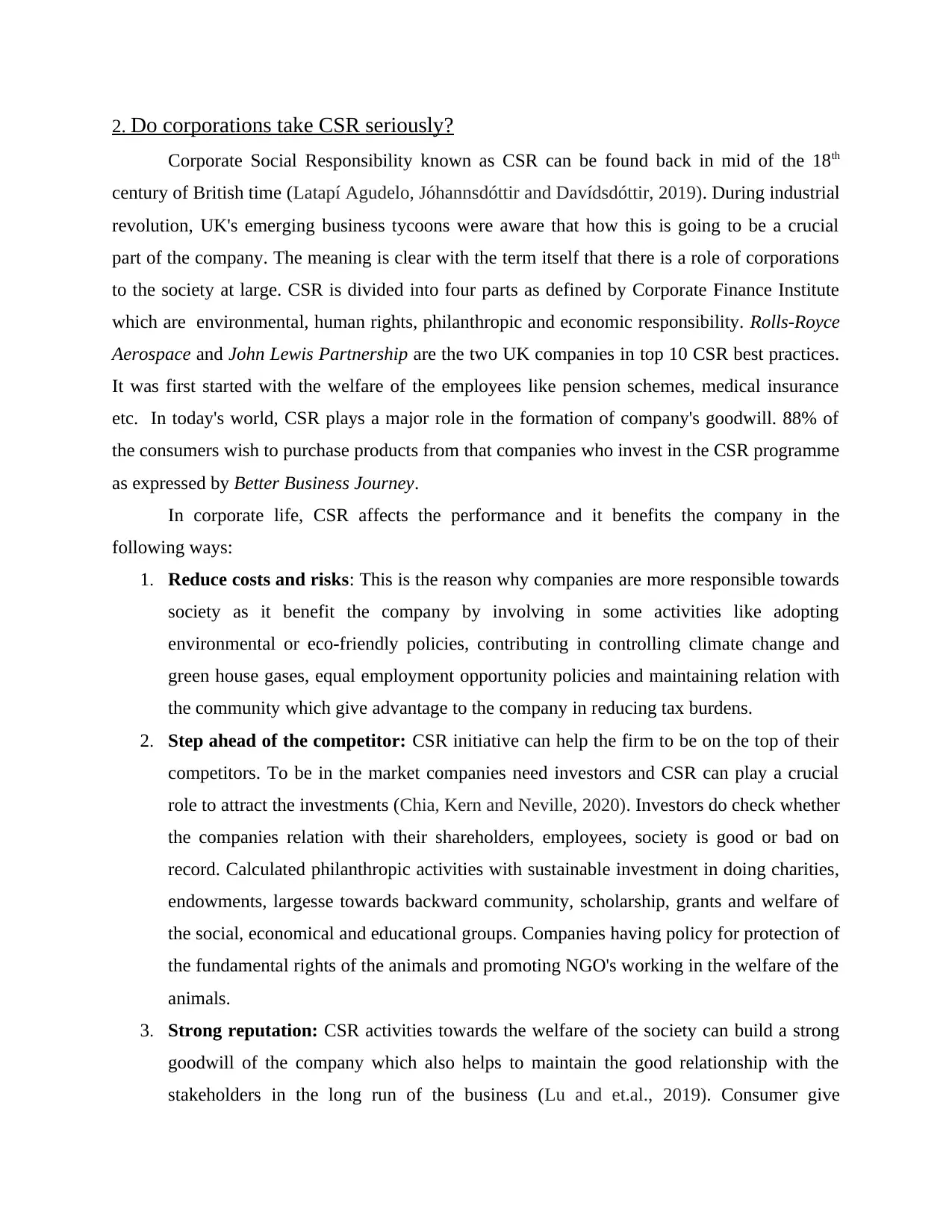
2. Do corporations take CSR seriously?
Corporate Social Responsibility known as CSR can be found back in mid of the 18th
century of British time (Latapí Agudelo, Jóhannsdóttir and Davídsdóttir, 2019). During industrial
revolution, UK's emerging business tycoons were aware that how this is going to be a crucial
part of the company. The meaning is clear with the term itself that there is a role of corporations
to the society at large. CSR is divided into four parts as defined by Corporate Finance Institute
which are environmental, human rights, philanthropic and economic responsibility. Rolls-Royce
Aerospace and John Lewis Partnership are the two UK companies in top 10 CSR best practices.
It was first started with the welfare of the employees like pension schemes, medical insurance
etc. In today's world, CSR plays a major role in the formation of company's goodwill. 88% of
the consumers wish to purchase products from that companies who invest in the CSR programme
as expressed by Better Business Journey.
In corporate life, CSR affects the performance and it benefits the company in the
following ways:
1. Reduce costs and risks: This is the reason why companies are more responsible towards
society as it benefit the company by involving in some activities like adopting
environmental or eco-friendly policies, contributing in controlling climate change and
green house gases, equal employment opportunity policies and maintaining relation with
the community which give advantage to the company in reducing tax burdens.
2. Step ahead of the competitor: CSR initiative can help the firm to be on the top of their
competitors. To be in the market companies need investors and CSR can play a crucial
role to attract the investments (Chia, Kern and Neville, 2020). Investors do check whether
the companies relation with their shareholders, employees, society is good or bad on
record. Calculated philanthropic activities with sustainable investment in doing charities,
endowments, largesse towards backward community, scholarship, grants and welfare of
the social, economical and educational groups. Companies having policy for protection of
the fundamental rights of the animals and promoting NGO's working in the welfare of the
animals.
3. Strong reputation: CSR activities towards the welfare of the society can build a strong
goodwill of the company which also helps to maintain the good relationship with the
stakeholders in the long run of the business (Lu and et.al., 2019). Consumer give
Corporate Social Responsibility known as CSR can be found back in mid of the 18th
century of British time (Latapí Agudelo, Jóhannsdóttir and Davídsdóttir, 2019). During industrial
revolution, UK's emerging business tycoons were aware that how this is going to be a crucial
part of the company. The meaning is clear with the term itself that there is a role of corporations
to the society at large. CSR is divided into four parts as defined by Corporate Finance Institute
which are environmental, human rights, philanthropic and economic responsibility. Rolls-Royce
Aerospace and John Lewis Partnership are the two UK companies in top 10 CSR best practices.
It was first started with the welfare of the employees like pension schemes, medical insurance
etc. In today's world, CSR plays a major role in the formation of company's goodwill. 88% of
the consumers wish to purchase products from that companies who invest in the CSR programme
as expressed by Better Business Journey.
In corporate life, CSR affects the performance and it benefits the company in the
following ways:
1. Reduce costs and risks: This is the reason why companies are more responsible towards
society as it benefit the company by involving in some activities like adopting
environmental or eco-friendly policies, contributing in controlling climate change and
green house gases, equal employment opportunity policies and maintaining relation with
the community which give advantage to the company in reducing tax burdens.
2. Step ahead of the competitor: CSR initiative can help the firm to be on the top of their
competitors. To be in the market companies need investors and CSR can play a crucial
role to attract the investments (Chia, Kern and Neville, 2020). Investors do check whether
the companies relation with their shareholders, employees, society is good or bad on
record. Calculated philanthropic activities with sustainable investment in doing charities,
endowments, largesse towards backward community, scholarship, grants and welfare of
the social, economical and educational groups. Companies having policy for protection of
the fundamental rights of the animals and promoting NGO's working in the welfare of the
animals.
3. Strong reputation: CSR activities towards the welfare of the society can build a strong
goodwill of the company which also helps to maintain the good relationship with the
stakeholders in the long run of the business (Lu and et.al., 2019). Consumer give
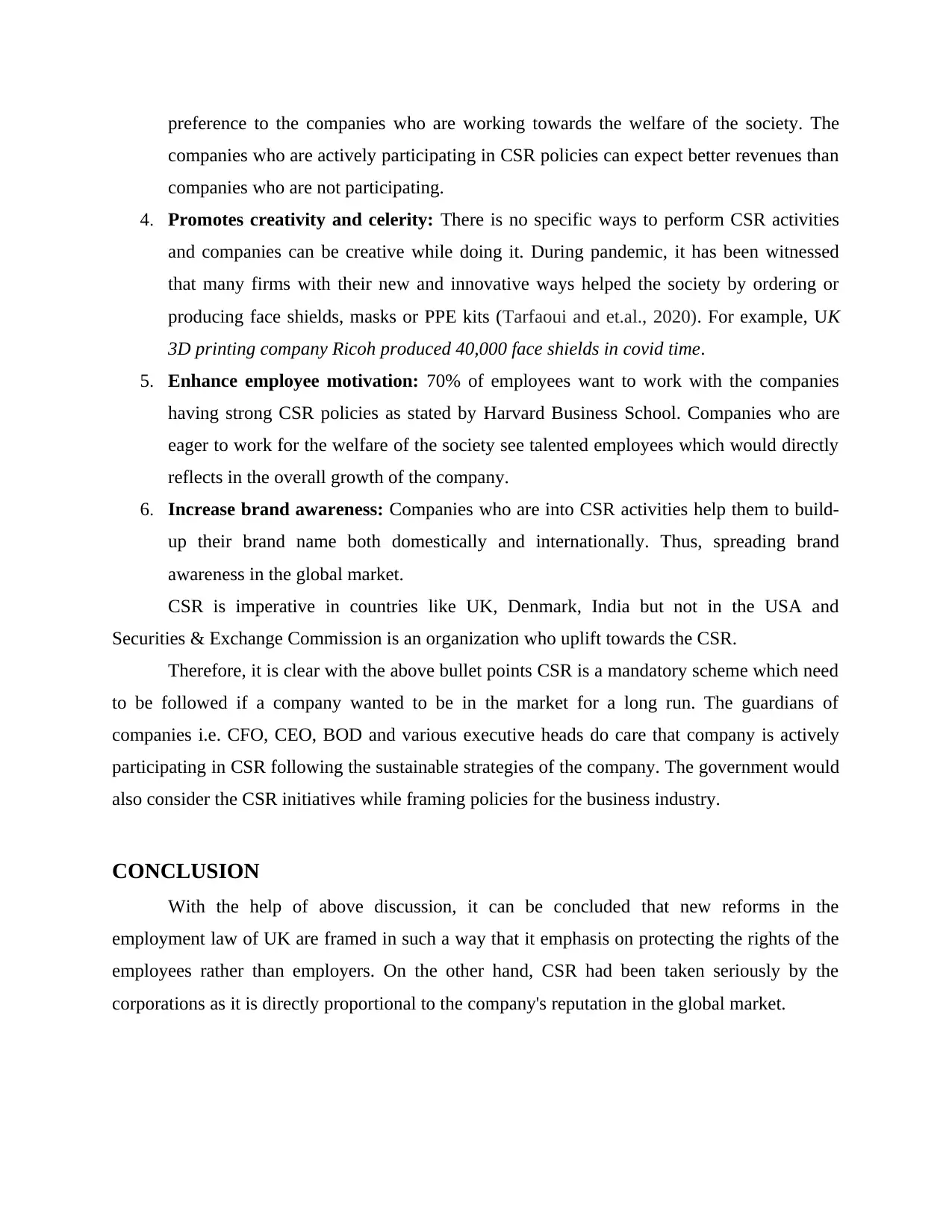
preference to the companies who are working towards the welfare of the society. The
companies who are actively participating in CSR policies can expect better revenues than
companies who are not participating.
4. Promotes creativity and celerity: There is no specific ways to perform CSR activities
and companies can be creative while doing it. During pandemic, it has been witnessed
that many firms with their new and innovative ways helped the society by ordering or
producing face shields, masks or PPE kits (Tarfaoui and et.al., 2020). For example, UK
3D printing company Ricoh produced 40,000 face shields in covid time.
5. Enhance employee motivation: 70% of employees want to work with the companies
having strong CSR policies as stated by Harvard Business School. Companies who are
eager to work for the welfare of the society see talented employees which would directly
reflects in the overall growth of the company.
6. Increase brand awareness: Companies who are into CSR activities help them to build-
up their brand name both domestically and internationally. Thus, spreading brand
awareness in the global market.
CSR is imperative in countries like UK, Denmark, India but not in the USA and
Securities & Exchange Commission is an organization who uplift towards the CSR.
Therefore, it is clear with the above bullet points CSR is a mandatory scheme which need
to be followed if a company wanted to be in the market for a long run. The guardians of
companies i.e. CFO, CEO, BOD and various executive heads do care that company is actively
participating in CSR following the sustainable strategies of the company. The government would
also consider the CSR initiatives while framing policies for the business industry.
CONCLUSION
With the help of above discussion, it can be concluded that new reforms in the
employment law of UK are framed in such a way that it emphasis on protecting the rights of the
employees rather than employers. On the other hand, CSR had been taken seriously by the
corporations as it is directly proportional to the company's reputation in the global market.
companies who are actively participating in CSR policies can expect better revenues than
companies who are not participating.
4. Promotes creativity and celerity: There is no specific ways to perform CSR activities
and companies can be creative while doing it. During pandemic, it has been witnessed
that many firms with their new and innovative ways helped the society by ordering or
producing face shields, masks or PPE kits (Tarfaoui and et.al., 2020). For example, UK
3D printing company Ricoh produced 40,000 face shields in covid time.
5. Enhance employee motivation: 70% of employees want to work with the companies
having strong CSR policies as stated by Harvard Business School. Companies who are
eager to work for the welfare of the society see talented employees which would directly
reflects in the overall growth of the company.
6. Increase brand awareness: Companies who are into CSR activities help them to build-
up their brand name both domestically and internationally. Thus, spreading brand
awareness in the global market.
CSR is imperative in countries like UK, Denmark, India but not in the USA and
Securities & Exchange Commission is an organization who uplift towards the CSR.
Therefore, it is clear with the above bullet points CSR is a mandatory scheme which need
to be followed if a company wanted to be in the market for a long run. The guardians of
companies i.e. CFO, CEO, BOD and various executive heads do care that company is actively
participating in CSR following the sustainable strategies of the company. The government would
also consider the CSR initiatives while framing policies for the business industry.
CONCLUSION
With the help of above discussion, it can be concluded that new reforms in the
employment law of UK are framed in such a way that it emphasis on protecting the rights of the
employees rather than employers. On the other hand, CSR had been taken seriously by the
corporations as it is directly proportional to the company's reputation in the global market.
⊘ This is a preview!⊘
Do you want full access?
Subscribe today to unlock all pages.

Trusted by 1+ million students worldwide
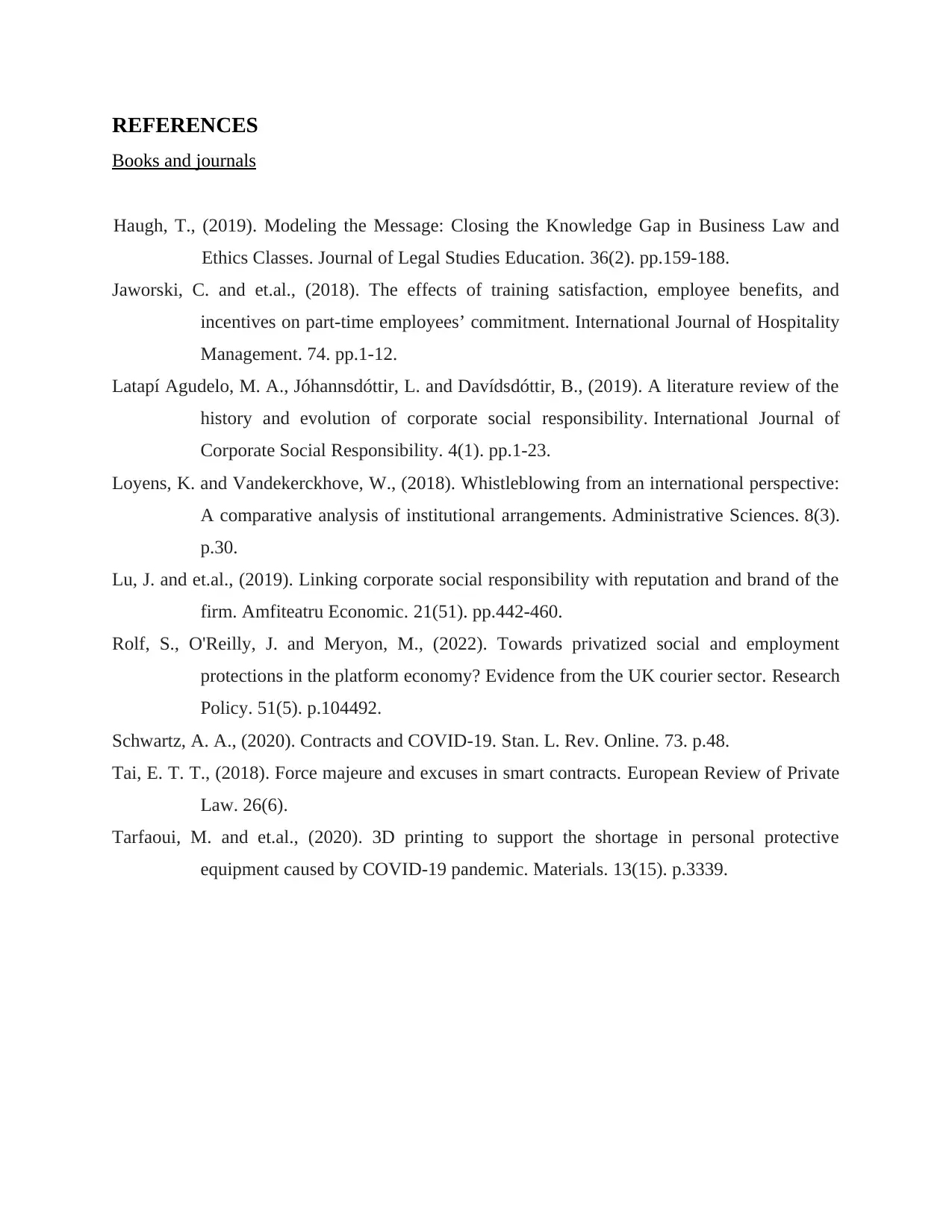
REFERENCES
Books and journals
Haugh, T., (2019). Modeling the Message: Closing the Knowledge Gap in Business Law and
Ethics Classes. Journal of Legal Studies Education. 36(2). pp.159-188.
Jaworski, C. and et.al., (2018). The effects of training satisfaction, employee benefits, and
incentives on part-time employees’ commitment. International Journal of Hospitality
Management. 74. pp.1-12.
Latapí Agudelo, M. A., Jóhannsdóttir, L. and Davídsdóttir, B., (2019). A literature review of the
history and evolution of corporate social responsibility. International Journal of
Corporate Social Responsibility. 4(1). pp.1-23.
Loyens, K. and Vandekerckhove, W., (2018). Whistleblowing from an international perspective:
A comparative analysis of institutional arrangements. Administrative Sciences. 8(3).
p.30.
Lu, J. and et.al., (2019). Linking corporate social responsibility with reputation and brand of the
firm. Amfiteatru Economic. 21(51). pp.442-460.
Rolf, S., O'Reilly, J. and Meryon, M., (2022). Towards privatized social and employment
protections in the platform economy? Evidence from the UK courier sector. Research
Policy. 51(5). p.104492.
Schwartz, A. A., (2020). Contracts and COVID-19. Stan. L. Rev. Online. 73. p.48.
Tai, E. T. T., (2018). Force majeure and excuses in smart contracts. European Review of Private
Law. 26(6).
Tarfaoui, M. and et.al., (2020). 3D printing to support the shortage in personal protective
equipment caused by COVID-19 pandemic. Materials. 13(15). p.3339.
Books and journals
Haugh, T., (2019). Modeling the Message: Closing the Knowledge Gap in Business Law and
Ethics Classes. Journal of Legal Studies Education. 36(2). pp.159-188.
Jaworski, C. and et.al., (2018). The effects of training satisfaction, employee benefits, and
incentives on part-time employees’ commitment. International Journal of Hospitality
Management. 74. pp.1-12.
Latapí Agudelo, M. A., Jóhannsdóttir, L. and Davídsdóttir, B., (2019). A literature review of the
history and evolution of corporate social responsibility. International Journal of
Corporate Social Responsibility. 4(1). pp.1-23.
Loyens, K. and Vandekerckhove, W., (2018). Whistleblowing from an international perspective:
A comparative analysis of institutional arrangements. Administrative Sciences. 8(3).
p.30.
Lu, J. and et.al., (2019). Linking corporate social responsibility with reputation and brand of the
firm. Amfiteatru Economic. 21(51). pp.442-460.
Rolf, S., O'Reilly, J. and Meryon, M., (2022). Towards privatized social and employment
protections in the platform economy? Evidence from the UK courier sector. Research
Policy. 51(5). p.104492.
Schwartz, A. A., (2020). Contracts and COVID-19. Stan. L. Rev. Online. 73. p.48.
Tai, E. T. T., (2018). Force majeure and excuses in smart contracts. European Review of Private
Law. 26(6).
Tarfaoui, M. and et.al., (2020). 3D printing to support the shortage in personal protective
equipment caused by COVID-19 pandemic. Materials. 13(15). p.3339.
1 out of 7
Related Documents
Your All-in-One AI-Powered Toolkit for Academic Success.
+13062052269
info@desklib.com
Available 24*7 on WhatsApp / Email
![[object Object]](/_next/static/media/star-bottom.7253800d.svg)
Unlock your academic potential
Copyright © 2020–2026 A2Z Services. All Rights Reserved. Developed and managed by ZUCOL.




